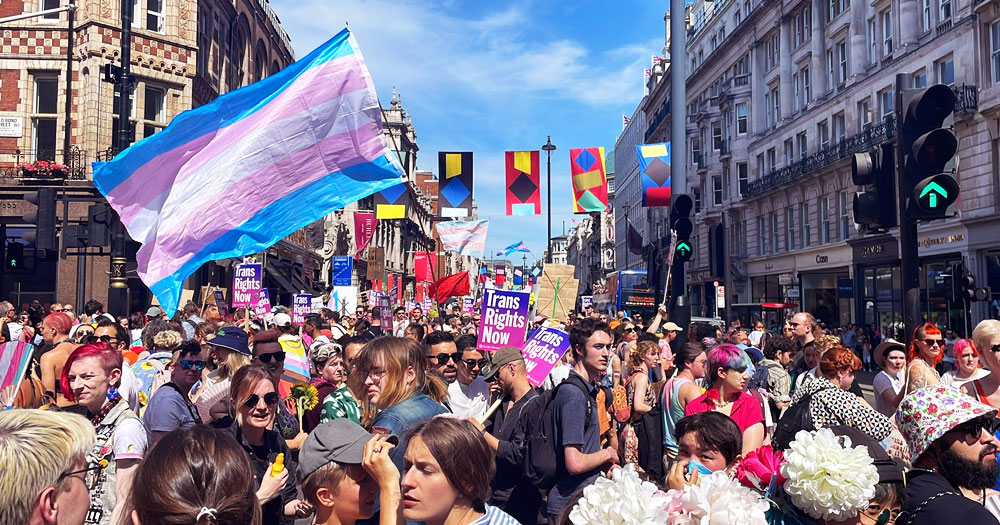On Monday, January 16, it was announced that the UK government will block the Gender Recognition Reform bill passed in Scotland last December. The Scottish government has now refused Rishi Sunak’s offer to cooperate on a revision of the bill.
For the first time in history, the UK government has invoked Section 35 of the 1998 Scotland Act, which allows them to stop a bill from becoming law in case London believes it will have adverse consequences on matters that pertain to the national government. According to the UK government, the bill in question could have an impact on the broader UK equality legislation.
The Gender Recognition Reform bill was introduced in Scotland in December 2022 and it allows trans people in the country to have their preferred gender recognised in legal documents through a self-declaration process, without the need to provide a medical diagnosis or other evidence.
The UK government’s decision to block such bill was announced yesterday by Scottish secretary Alister Jack, who has made a statement to MPs giving the Section 35 order today at 1.30pm. The move is likely to trigger a legal battle between Edinburgh and London, especially after the former rejected a proposal from Sunak’s government to cooperate on a revision of the bill that would not impact the UK Equality Act.
Also confirmed:
• Statement from Secretary of State for Scotland Alister Jack: "Exercise of section 35 of the Scotland Act 1998 with regard to the Gender Recognition Reform (Scotland) Bill."
— UK House of Commons (@HouseofCommons) January 17, 2023
The Scottish government contends that the Gender Recognition Reform bill does not have any negative consequences on the UK equality law. As Shona Robinson, a social justice secretary in the Scottish government who took the bill through parliament, said in an interview: “Using the section 35 nuclear option, I think, reveals that they don’t have a legal basis to challenge it, and this is more about the politics than it is about the legislation.”
“I don’t think the UK government are going to come forward with a suggestions of a tweak here or a tweak there. They are fundamentally against this bill. They don’t like this bill.” Robinson continued. “And they are using their power to stop the democratically elected Scottish parliament taking forward legislation that had the overwhelming support of that parliament.”
Summary of my views on UK gov attempt to veto @ScotParl decisions – covers both the attempt to block this particular piece of legislation (passed by a substantial majority, inc MSPs from all parties) and the very significant wider issue of principle . https://t.co/1V5w55D5Sd
— Nicola Sturgeon (@NicolaSturgeon) January 16, 2023
Scotland’s first minister Nicola Sturgeon also condemned the decision, saying that the UK government had “no grounds” to block the bill and describing it as a “full-frontal attack on our democratically elected Scottish Parliament and its ability to make its own decision on evolved matters”.
Many LGBTQ+ activists have also spoken out against this unprecedented move, calling it “unacceptable” and “a shameful attack on trans rights”. Stonewall CEO Nancy Kelley addressed the issue, saying: “This is a piece of legislation that simply seeks to make the process for legally recognising a trans man or trans women’s gender more respectful and straightforward”.
We are saddened the PM has taken unprecedented steps to block implementation of the Scottish Gender Recognition Reform Bill.
These are not the actions of a government that can stand on the international stage as a defender of LGBTQ+ rights.
Our statement https://t.co/wOk2mTZ0lA
— Stonewall (@stonewalluk) January 16, 2023
“Scotland’s bill aligns it with leading international practice endorsed by the United Nations and adopted by 30 countries, including Canada, Australia, New Zealand, Ireland and most of the United States of America.” Kelley added.
Other campaigners from Stonewall explained that “there are no down-sides” to the Scottish gender recognition bill, saying: “For example when Ireland did it, nobody else was affected, except trans people who for the first time were able to have their gender recognised in a straightforward and empowering way by the state.”
According to the manager of Scottish Trans, Vic Valentine, for “the UK government to seek to block the Scottish democratic process in this way, simply because they disagree with the welcome decision the Scottish parliament has made to improve trans people’s lives, is unacceptable.”
© 2023 GCN (Gay Community News). All rights reserved.
Support GCN
GCN is a free, vital resource for Ireland’s LGBTQ+ community since 1988.
GCN is a trading name of National LGBT Federation CLG, a registered charity - Charity Number: 20034580.
GCN relies on the generous support of the community and allies to sustain the crucial work that we do. Producing GCN is costly, and, in an industry which has been hugely impacted by rising costs, we need your support to help sustain and grow this vital resource.
Supporting GCN for as little as €1.99 per month will help us continue our work as Ireland’s free, independent LGBTQ+ media.
